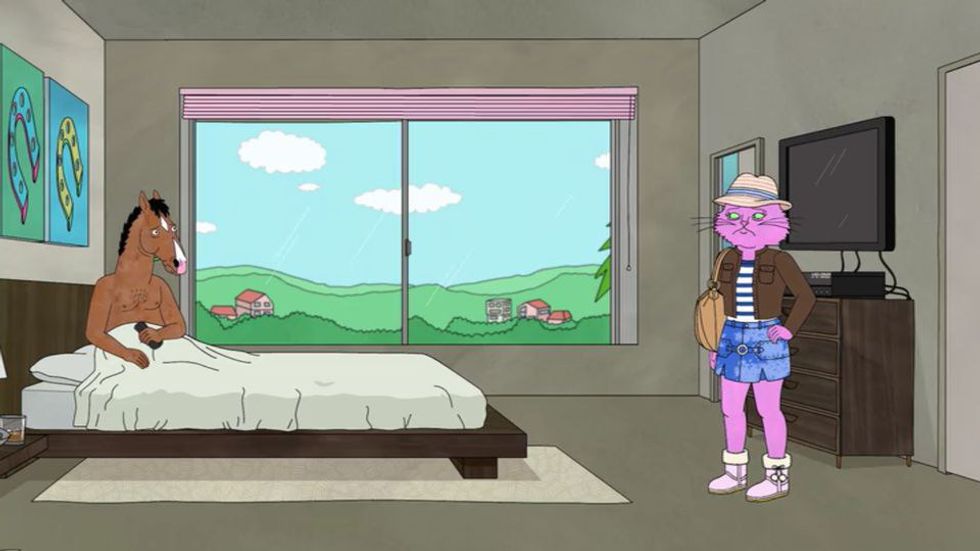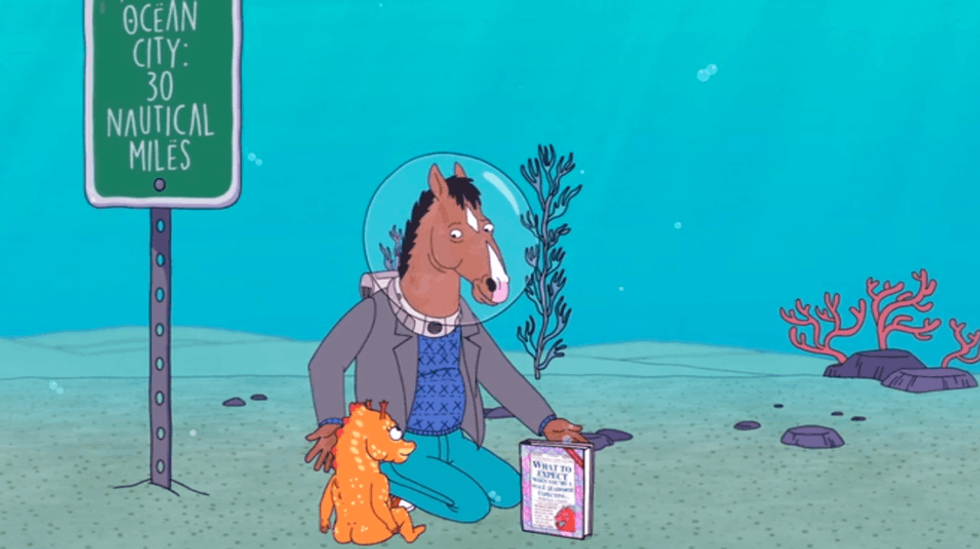If you've watched "Bojack Horseman," you know that this is a show that defies categorization. There's a copious amount of fantastically written jokes, but there's also a very tragic and existential story that plays out for each of the characters in Bojack's life. The last season looked like it would be nearly impossible to match, but this third season may even surpass it. The voice cast is just as diverse and talented as before, the wit remains quick and snappy, and the story is deeply compelling.
For anyone reading this article who hasn't watched or heard of "Bojack Horseman,' allow me to introduce you to one of Netflix's most unique original series. The story takes place in a world where all animals are anthropomorphized (a fancy word for saying they walk and talk like humans) and appear in regular life just as any normal human would. Bojack Horseman was the star of a '90s sitcom called "Horsin' Around," in which he took in three children and raise, and we are introduced to the man he became: an irritable and reclusive alcoholic with a slew of issues and substance abuse problems.
Each season focuses on a certain point of Bojack's life, and how he attempts to recover from his tribulations or learn to accept and live with the consequences. In the first season, his relationship with his parents and his childhood are both examined through the lens of a biography being written about him. In the second, his introduction to show business and the friends he made (and lost) after finding success on "Horsin' Around." This season focuses on something we haven't gotten a chance to see yet: Bojack in 2007 as he ventures out of his reclusion for the first time to work on a new TV show. This manifests itself as he is faced with the reality that many people thought that "Horsin' Around" was a terrible show.
Warning: Spoilers for the first two seasons of "Bojack Horseman" below.
"It's not about being happy."
Show creator Raphael Bob-Waksberg stated that the show is "about consequences... it's about actions having an effect on others and the world around you, and yourself." The article linked is a fascinating read about the motivations and themes in the third season, but contains massive spoilers so please don't read it until you've watched all twelve new episodes. But if you get a chance, it's a phenomenal interview that sheds some great new light on the story.
The end of the second season had Bojack feeling more optimistic. But if you were hoping that things were finally going better for the Secretariat star after hitting rock bottom, he hasn't quite gotten to rock bottom yet. The events of "Escape to L.A." leave Bojack struggling to deal with how he feels and what he's done. He is immediately sprung into a life he hasn't known for a long time: being famous.
With the help of Ana Spanikopita and Princess Carolyn, Bojack finds himself on the road to the Oscars. This means countless interviews, festival award shows, and public appearances; something that begins to wear down on him as he finds himself continuously reminded of his failures in the past. Even going in to the first episode, it seems inevitable that Bojack's self-destructive tendencies will return and he will find himself drowning in his own miseries before the season is out.
"Back in '07."
It wouldn't be a season of "Bojack Horseman" if we didn't have an intensely detailed and satirical period piece. This time, we get to see the creation and subsequent failure of "The Bojack Horseman Show" in 2007. This illuminates the charm and genius that this show has managed to create. There are some painful and heart-breaking moments, but this doesn't take anything away from the brilliant jokes that the characters deliver.
The series has managed to find its own voice in its sense of humor with setups and gags everywhere that usually demonstrate that hindsight is 20/20. In the return to 2007, we millennials get to experience some good ol' shame in our past selves from nine years ago. Or just a nice sense of nostalgia. Either way, it's an incredibly clever to progress the story and something we haven't seen the likes of in some time.
In this way, Raphael shows the true power of the show: ridiculousness. In a world where it is not only acceptable but considered normal for animals to walk and talk just like humans, pushing the boundaries is something to be expected. It's hard to think of a show that has parodied the 2000s in the same way that "Bojack Horseman" does, in such a stark and honest way. And this is far from the only time the show has made some really remarkable episodes. Many fondly recall the episode from the first season when Bojack, Todd and Sarah-Lynn all go on a bender. (No spoilers, but don't you worry if you want to see Bojack go on a legendary bender, you'll get to enjoy that before the season is over -- though enjoy might not be the right word.)
"All we have are the connections we make."
Bojack has never exactly been good at maintaining friendships; at any given time, all of his relationships are about to fall apart due to his sense of self-importance and self-hatred. He frequently pushes away those who try to get close to him because of his discomfort in relating to people. Ultimately though, people never really exit Bojack's life, not in the long run. They usually end up being drawn back in, somehow -- something that can usually be blamed on Bojack.
This season shows him at some new all-time lows. This is fresh off of his realization that life gets easier and onto his acceptance that it probably won't get easier for him. His desperate searches for happiness slowly fade away from actually trying to better himself or his life. But there are still always glimmers of hope, even in the darkest of times. If we were just watching a show about a guy who's an asshole and miserable all the time, no one would watch it.
Bojack is a deep and interesting character. He's unique in a lot of ways and this series sheds some light on mental health that people are unwilling to look at. It also shows how acceptance of these disorders can be pushed to the limit by those who live with him. Ultimately, this season especially is about Bojack trying to rekindle old relationships and try to maintain the ones he still has left. It easily matches the energy and greatness of the second season and even surpasses it at some points. This is a great time to start watching the show if you haven't already and an even better time to binge through it all in a day and start the long wait for the fourth season.
Notable episodes
Episode 2: "The Bojack Horseman Show"
In the return to 2007, we get to see Bojack get back into television with the help of the mysterious Jill Pill that was referenced in the second season, as well as his subsequent failure. But it's also when we see the beginning of Bojack and Princess Carolyn's relationship, as well as how Mr. Peanutbutter and Diane first meet and an introduction of a romantic interest for Todd. All in all, it's a great way to start the new season with a fantastic blast from the past.
Episode 4: "Fish Out Of Water"
In the most ambitious episode of the series so far, Bojack attends a film festival underwater where he finds out that Kelsey Jennings, the first director of Secretariat, is also in attendance. Making his apologies to her becomes difficult when he realizes he cannot speak underwater and cannot understand anyone else. It's a brilliant self-contained episode that captures all of the charm of the series and elevates into almost art-house level animation.
Episode 7: "Stop The Presses"
In a concept that only this series could create, Bojack attempts to unsubscribe from the LA Gazette and we bear witness to the conspiracy behind the newspaper: even if no one reads it, everyone must be subscribed. When he insists on trying to cancel their services, he is contacted by a mysterious woman named "The Closer" who attempts to convince him to keep his subscription while simultaneously giving him a psychological evaluation. It's hilarious and introspective, giving us deep insight into Bojack while still leaving us to question just what the f**k is happening.


























